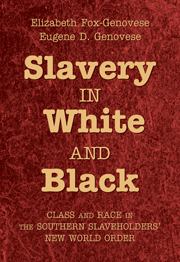Book contents
- Frontmatter
- Contents
- Preface
- Manuscript Collections Cited
- List of Abbreviations
- Slavery in White and Black
- Introduction
- 1 The Impending Collapse of Capitalism
- 2 Hewers of Wood, Drawers of Water
- 3 Travelers to the South, Southerners Abroad
- 4 The Squaring of Circles
- 5 The Appeal to Social Theory
- 6 Perceptions and Realities
- Afterword
- Index
1 - The Impending Collapse of Capitalism
Published online by Cambridge University Press: 05 June 2012
- Frontmatter
- Contents
- Preface
- Manuscript Collections Cited
- List of Abbreviations
- Slavery in White and Black
- Introduction
- 1 The Impending Collapse of Capitalism
- 2 Hewers of Wood, Drawers of Water
- 3 Travelers to the South, Southerners Abroad
- 4 The Squaring of Circles
- 5 The Appeal to Social Theory
- 6 Perceptions and Realities
- Afterword
- Index
Summary
It may be, that such a slavery, regulating the relations of capital and labor, though implying some deprivation of personal liberty, will prove a better defense of the poor against the oppression of the rich, than the too great freedom in which capital is placed in many of the free states of Europe at the present day. Something of this kind is what the masses of free laborers in France are clamoring for under the name “the right to labor.” … It may be, Christian slavery is God's solution of the problem about which the wisest statesmen of Europe confess themselves ‘at fault.’
—The Reverend George D. Armstrong of NorfolkThe Doctrine Emerges
That the black slaves of the South fared better than the mass of the world's free workers and peasants became gospel among southern whites of all classes. In seventeenth-century Virginia planters asserted, with some justification, that their slaves worked a shorter and less rigorous day than English herdsmen. At the beginning of the eighteenth century Robert Beverley, in his History and Present State of Virginia, maintained that black slaves and white servants in Virginia did not work as long or hard as husbandmen and agricultural laborers of England. In the 1720s the Reverend Hugh Jones, a professor at the College of William and Mary, acknowledging that slaves did most of the hard work, reported their food and material conditions superior to those of English woodcutters.
- Type
- Chapter
- Information
- Slavery in White and BlackClass and Race in the Southern Slaveholders' New World Order, pp. 11 - 57Publisher: Cambridge University PressPrint publication year: 2008



